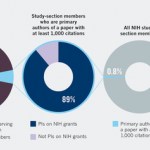Funding
In the wake of the Willie Soon scandal, scientists are taking a hard look at the Smithsonian and other institutions at the forefront of research and public outreach. Should these organizations really be supported by industrialists who deny that carbon emissions continue to warm the planet, disrupt the climate, amplify extreme weather, and threaten to swallow us in a deluge of melted ice and presumably locusts? For that matter, should exhibits on evolution be subject to the whims of donors who insist the Earth is only six thousand years old? If not, where will less ideologically…
For all the worship of "translational" research that is currently in vogue, it needs to be remembered that a robust pipeline of basic science progress upon which to base translational research and clinical trials is absolutely essential if progress in medicine is to continue. Without it, progress in SBM will slow and even grind to a halt. That's why, in the U.S., the National Institutes of Health (NIH) is so critical. The NIH funds large amounts of biomedical research each year, which means that what the NIH will and will not fund can't help but have a profound effect shaping the pipeline of…
by Kim Krisberg
Just a few years ago in Butte County, Calif., it wasn't unusual for public health workers to administer more than 1,000 free HIV tests every year. In true public health fashion, they'd bring screening services to the people, setting up in neighborhoods, parks and bars, at special community events and visiting the local drug treatment facility and jail. The goal was prevention and education, and no one got turned away.
That was before 2009, which is when California state legislators cut millions in HIV prevention and education funds from the state budget. The cut meant that…
there is a curious result in behavioural economics, which shows that paying people to do what they like to do, sometimes provides a disincentive for them to do it, and people correspondingly lower their effort to do the task.
The example I recently came across, from the 7 Rules of Behavioural Economics, or some such, was that if you pay people to have their friends for dinner, they entertain less.
But, enough about the decline of intradepartmental socialization...
The reason I thought of this, is that yesterday we congratulated a colleague on a nice result, and another colleague asked some…
Last week, the House of Representatives approved an amendment to a 2013 spending bill that would prohibit the National Science Foundation from devoting any of its budget to its political science program, which, according to Inside Higher Ed, allocated around $11 million in peer-reviewed grants this year. The amendment was the brainchild of Congressman Jeff Flake of Arizona, who objected to NSF funding studies that "might satisfy the curiosities of a few academics" without benefiting society. Among the previously funded studies Flake apparently considers to be poor use of taxpayer funds are…
by Kim Krisberg
A couple weeks ago on the southern-most tip of the continental United States in Key West, nearly 70 residents gathered at a town hall meeting to talk about mosquitoes. And not just any mosquito. A special, genetically modified mosquito designed to protect people's health.
While the modified mosquito has yet to make the two-mile wide island its home, local mosquito control officials are busy making the case that its intentional release will help safely contain the risk of mosquito-borne dengue fever, which made a startling reappearance in Key West in 2009. The male mosquito is…
by Kim Krisberg
Joy Jay has the sweetest Southern accent you'll ever hear. It's the kind of accent that makes her news about the state of mental health services in South Carolina harder to hear than usual.
"Mental health has taken some of the biggest (funding) cuts of any agency in the state," said Jay, executive director of Mental Health America of South Carolina. "It's really affected the number of people who can be served -- the door is very narrow now for people with chronic, persistent (mental) illness. And for people with temporary problems, they can't even get into the system; there's…
by Kim Krisberg
It only takes a few minutes of talking with Scott Becker to realize just how passionate he is about public health. In fact, his enthusiasm is contagious. Maybe that's why he isn't mincing his words.
"What keeps me up at night is how we are going to maintain the core and critical services we have," said Becker, executive director of the Association of Public Health Laboratories. "If the question is 'how low can we go?' My answer is 'we're there.' I used to be on a more hopeful note, but I can't do that anymore."
Becker is talking about the worrisome state of public health…
On Starts With a Bang, Ethan Siegel investigates the hamstringing of the James Webb Space Telescope. Originally scheduled to launch in 2013 at a cost of $5.1 billion, the JWST was pushed to 2015 and $6.5 billion by a government review panel that faulted NASA mismanagement. But the revised numbers counted on timely infusions of cash, and because "a miserly US Congress" withheld them, the cost of the project ballooned to $8.7 billion, with a new launch date of 2018. Although its unprecedented mirrors are nearly finished—along with its electrical instruments and their housing—the JWST still…
I felt a sense of déjà vu Tuesday morning when I heard NPR's Nell Greenfieldboyce reporting on Senator Tom Coburn's attacks on National Science Foundation-funded research. I realized that the same thing happened last August, and I wrote about it in a post called "Scoring Political Points by Misunderstanding Science." Last year, the report mocked research into addiction and older adults' cognition (among many other projects) because the projects involved administering cocaine to monkeys and introducing senior citizens to Wii games. This year, the projects up for ridicule include…
One of the points about science funding I've tried to make over the years (we have been blogging a long time, haven't we?) is that the overheads and indirect costs associated with federal grants drive a lot of university decisions--there's a lot of money there. But this funding also has significant macroeconomic effects, especially in research-heavy states like Massachusetts. A local paper, The Boston Courant, describes the effects of the coming NIH cuts, due to the ending of the ARRA and the coming budget cuts, to the Boston economy. I'm quoting extensively from the August 12, 2001…
Like Atrios, I don't believe this--nor would any person who takes mass transit or lives in (or near) an urban area:
Last month, I spoke to Christina Romer, Larry Summers and Jared Bernstein on this question. The three of them were arguably the administration's most persistent and consistent advocates for more stimulus. But they all said the same thing: The bigger the stimulus became, the harder it got to spend.
"We had a hard time spending $800 billion quickly, and with that much stimulus, the issue of diminishing returns could be important," said Romer. "I don't believe we could have…
This is why all the concern about the fake crisis of the U.S. budget deficit is so harmful--it has real effects on people's lives, including scientists:
Both Republican and Democratic proposals would cut more than US$1 trillion in spending over a decade, amounting to a budget reduction of at least $100 billion per year. Nature examines how this might affect the scientific community....
Republicans have made it clear that they will not cut defence spending, and Democrats are keen to protect social security and health-care programmes such as Medicare and Medicaid. Thus, the cuts are likely to…
As with history in general, I suppose the victors write--or rewrite--economic history too. One of the arguments for balancing budgets that's floating around is that Clinton got us a surplus, times were good, and therefore, we should do it again. Of course, things were better for some people, including those at the bottom (which is a worthwhile gain), but most of the spoils went to those at the top. As the joke went, "Clinton has created millions of jobs, and I'm working three of them." Snark aside, the reason why Clinton was able to lower the debt was no mystery: private sector debt…
This post might have to get filed under "careful what you wish for", but Martin Robbins' latest column about the cozy relationship between science journalists and the scientists they cover seems to have struck a nerve, if The Twitter is any indication. Here's a good snippet:
Churnalism is a real problem in science reporting, to the extent that it feels a bit boring to keep going on about it, but the wider issue is this lack of actual, well, journalism. As I said in that piece; if journalists aren't contributing original reporting, or providing context, or challenging statements made by…
A while ago, I discussed Republican Senator Tom Coburn's NSF snipe hunt. Well, the EU has a doozy of an actual research-related scandal:
Italian authorities and the European Anti-Fraud Office (OLAF) in Brussels, Belgium, have confirmed that they are prosecuting members of a large network accused of pocketing more than â¬50 million (US$72 million) in EC grants for fake research projects. In Milan, Italy, the Finance Police last month charged several individuals in relation to the fraud. In Brussels, meanwhile, the EC has terminated four collaborative projects in information technology, and…
There's been a lot of discussion about the report released by Senator Tom Coburn (R-OK) alleging waste and fraud by the National Science Foundation (NSF), including posts by Dr. O, Steve Silberman, Namnezia, NeuroDojo, The Prodigal Academic, and Stephanie Pappas. The first thing to realize about Tom Coburn is that he's a full-blown wackaloon--in 2004, Coburn was warning us about the looming lesbian threat:
OKLAHOMA CITY (AP) - The Republican Senate candidate in Oklahoma warns of "rampant" lesbianism in some schools in the state in a tape released Monday by his Democratic opponent.
The remark…
The Wall Street Journal reports an estimate of the economic impact of the Human Genome Project (italics mine):
Of the $3.8 billion federal funding for the human-genome project, $2.8 billion originated at the U.S. National Institutes of Health, and the rest at the Department of Energy.
That $3.8 billion, along with subsequent capital provided by the government and the private sector, generated a total return of roughly $49 billion in direct and indirect federal tax revenues over the last two decades or so. (The $3.8 billion is worth about $5.6 billion in constant 2010 dollars.)
Over the same…
By way of DrugMonkey, we come across NIH's new working group that "will examine the future of the biomedical research workforce in the United States." It's headed by Princeton's Shirley Tilghman, who in a recent interview, said:
At the root of the problem is the fact that we are overproducing Ph.D.s. As a consequence, there are too many people chasing too few jobs and too few grant dollars. This problem will only get worse in the next decade, given the current federal budget.
I believe there could be changes made to the structure of the typical biomedical research laboratory. The typical lab…
Doug Natelson raises a good question about when data should be made publicly available:
How much public funding triggers the need to make something publicly available? For example, suppose I used NSF funding to buy a coaxial cable for $5 as part of project A. Then, later on, I use that coax in project B, which is funded at the $100K level by a non-public source. I don't think any reasonable person would then argue that all of project B's results should become public domain because of 0.005% public support. When does the obligation kick in?
This is actually a fairly common problem in…

